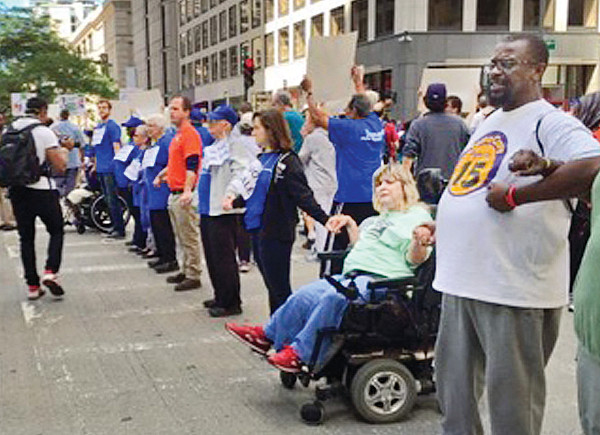
bureaucracy.
PHOTO/JANE ADDAMS SENIOR CAUCUS
CHICAGO, IL — In Franz Kafka’s novel, The Castle, a land surveyor, as ordered, leaves his home, travels a great distance, and arrives at his ruler’s village to discover his services are no longer required, despite the summons. An official explains the situation: “In an administration as large as [this], it can happen at some point that one department issues an order, another a second, neither department knows of the other. . . and so a little confusion can nonetheless arise.” Angry and perplexed, the surveyor responds that the explanation supplies “some insight into the ridiculous tangle that may under certain circumstances determine a person’s life.” Later, he emphatically insists upon knowing exactly what his rights are.
The Chicago Housing Authority (CHA) is a bureaucratic labyrinth that has carte blanche to treat its senior residents with no respect for their rights or their physical and emotional health. The building where I live, owned by CHA for just over a year, is about to undergo renovation and we may be subject to relocation. I investigated to find out what we might face and what rights we have.
CHA and its agents inform residents of renovations with very little notice and with no specific person consistently available to answer questions or provide exact details. They supply written updates and notices, but only in English, ignoring the needs of non-English speaking residents. Residents are often requested to waive their right to the minimum 30-day notice. Regardless of disabilities or specific needs, there is no individual planning for each person’s move. Required assistance in packing and moving is not regularly available. A few days can elapse between notification and move, or moving schedules can extend to months while residents wait and live out of boxes.
Residents are given lists of CHA buildings to investigate for relocation, with no transportation assistance or any idea of what might be available. In many cases, these buildings do not know that people will be visiting to find apartments nor do they have the necessities such as grab bars, wheelchair ramps, accessible doorways and the like. Necessary transfer of utilities to their new apartments, with required transfer fees, etc., become the responsibility of the residents. At one building, residents fought for months and finally received, with the assistance of Jane Adams Senior Caucus and attorneys at the Shriver Center, rent credits to offset some of the financial hardships incurred.
While those that remain in their buildings are exposed to noise, dust, lead and perhaps even asbestos hazards and lose community rooms, computer facilities, cafeterias and other amenities, those who are relocated often are nowhere near their original buildings, miss their familiar communities and social contacts of many years.
This is about senior citizens, many in frail health, and who, like the land surveyor, have traveled far, seeking to live with dignity, something that the CHA apparently does not consider a human right.
*I want to acknowledge information and assistance shared with to me in the preparation of this article by JASC, Shriver Center for Poverty Law and the wonderful activist residents of a number of CHA buildings.
